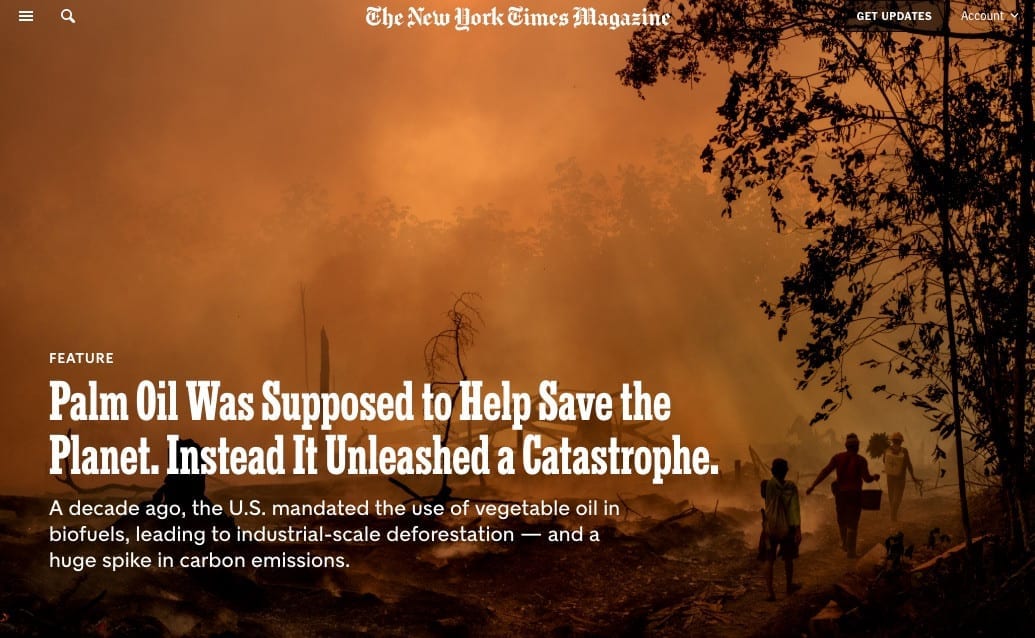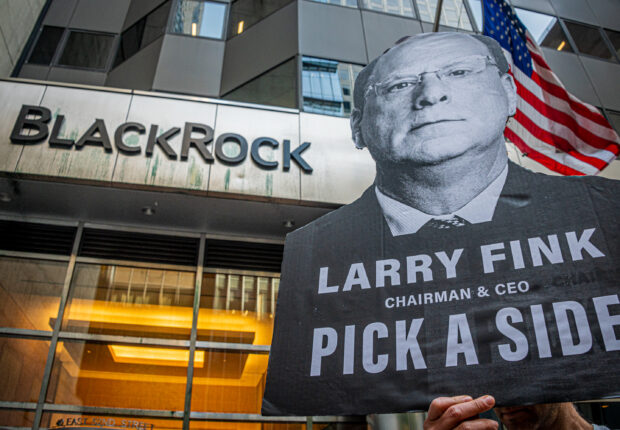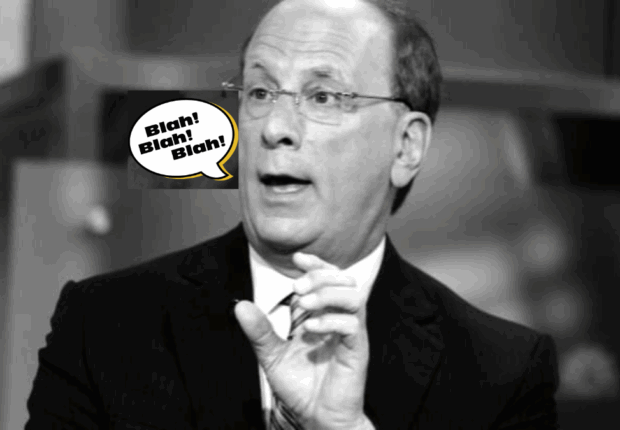
Palm oil was supposed to save the planet, but instead it unleashed a catastrophe. U.S. policies and financing including from BlackRock are at the heart of the problem.

This past Sunday, the New York Times Magazine ran a terrific in-depth feature titled Palm Oil Was Supposed to Help Save the Planet. Instead It Unleashed a Catastrophe. It featured BlackRock as one of the main US investors in dodgy deforestation practices. Jeff Conant at our partner Friends of the Earth worked closely with the reporter, here are his four takeaways:
Biofuels are not a climate solution
When biofuels began to be developed at market scale about a decade ago, there was a lot of hope that swapping out fossil fuels for fuels made from plants would provide a silver bullet solution for greening the transportation sector. As NYT Mag writes:
In the mid-2000s, Western nations, led by the United States, began drafting environmental laws that encouraged the use of vegetable oil in fuels — an ambitious move to reduce carbon dioxide and curb global warming. But these laws were drawn up based on an incomplete accounting of the true environmental costs. Despite warnings that the policies could have the opposite of their intended effect, they were implemented anyway, producing what now appears to be a calamity with global consequences …
The tropical rain forests of Indonesia, and in particular the peatland regions of Borneo, have large amounts of carbon trapped within their trees and soil. Slashing and burning the existing forests to make way for oil-palm cultivation had a perverse effect: It released more carbon. A lot more carbon.
NASA researchers say the accelerated destruction of Borneo’s forests contributed to the largest single-year global increase in carbon emissions in two millenniums, an explosion that transformed Indonesia into the world’s fourth-largest source of such emissions.
Instead of creating a clever technocratic fix to reduce American’s carbon footprint, lawmakers had lit the fuse on a powerful carbon bomb that, as the forests were cleared and burned, produced more carbon than the entire continent of Europe.
It turns out that, like a lot of techno-fixes, swapping fossil fuels for plant-based fuels is merely shuffling deck chairs on the Titanic.
The palm oil boom has spurred economic growth…mostly for the super-rich and the corporate class
One of the arguments for ongoing expansion of the palm oil industry is that, like all extractive industries, palm oil brings economic growth. “When the large companies began to expand their timber and palm-planting to Kalimantan, they brought roads, construction and an influx of goods. They also offered jobs.” This is all true. But at the same time, “The unprecedented palm-oil boom, meanwhile, has enriched and emboldened many of the region’s largest corporations, which have begun using their newfound power and wealth to suppress critics, abuse workers and acquire more land to produce oil.”
Indeed, 14 of Indonesia’s 32 billionaires made their billions from palm oil.
Of course, there is no way to generate wealth in this way without causing irreparable damage to ecosystems: “As the money flowed, so did the development. From 2007 to 2014, palm concessions in Kalimantan more than tripled. Bumitama alone was planting roughly 37,000 acres of palm each year. Across Indonesia, trees were cut down at a rate of three acres every minute to make room. Soon, palm plantations extended in every direction.”
The palm oil industry is built on corruption and violence against local land defenders.
The article does a masterful job of recognizing just how central corruption and violence are to the palm oil industry. The large-scale plantation development seems to go hand-in-glove with systemic violence and corruption. NYT writes:
The palm companies keep getting stronger. In 2014, Indonesia’s highest judge and three associates were convicted in a huge bribery scandal that journalists have linked to palm land deals in Borneo. A few years later, a Kalimantan governor was caught granting palm concessions to family members, who flipped them back to the companies that paid for his election. Stories of corruption, and threats to keep it quiet, were legion. Global Witness has counted at least eight assassinations of Indonesian environmentalists fighting palm oil.
U.S. policies and U.S. financing are at the heart of the problem
Of course, not only U.S. and EU biofuel policies have driven the palm oil boom. It’s also the flood of private investment from around the world that followed the initial biofuel policy mandates — investments from Malaysian and Indonesian banks as well as Wall Street firms and even, most likely, your own pension fund.
As Lustgarten reports in the article, when we brought Zenzi Suhadi from Indonesia to Washington to talk to the Senate earlier this year, his message was clear:
Suhadi wanted to tell the lawmakers the same thing he told them in two previous visits to Capitol Hill: that the palm trade, driven by American investment, is slowly killing his country. “It’s important for you to understand that all acts of deforestation in Indonesia start with a signature,” he said. “And more than a little of it starts right here.” …
The connection matters because the Salim Group has benefited from more than $1.5 billion in loans and capital from foreign investors, including the American firms BlackRock and Vanguard, and Salim companies have pledged that their palm oil is not a product of recent deforestation or peatland destruction. Satellite images from 2017 confirmed that the forests on the Sintang plantations were now virtually gone.
If we’re going to turn around the deforestation crisis and its huge contribution to the climate crisis, we need to fundamentally transform capitalism. One way to attack the problem is to force a shift in the business practices of the largest investment firms — the likes of Vanguard and BlackRock, which manage assets in the trillions and have millions of clients worldwide. Despite increasingly loud lip service to sustainability, BlackRock is the largest U.S. investor in the palm oil sector, and the largest investor in climate destruction on earth. That’s why our new campaign addresses both fossil fuels and deforestation — the twin drivers of the climate disaster — by tackling BlackRock’s Big Problem head-on.
BlackRock’s big problem, and U.S. policymakers’ big problem, is all of our big problem. As Lustgarten writes at the end of the piece:
The central problem, of course, is that the goals of Paris — slowing planetary warming just enough to allow humans time to adapt to excruciating and inevitable changes, including flooding coastlines, stronger hurricanes and perpetual famine and drought — are unlikely to ever be achieved without stopping deforestation. The planet’s forests have the potential to sequester as much as a third of the carbon in the air.
In our view, the single best way for us in the U.S. to do our part is to ramp down our energy use, reduce our consumption of luxury goods — including the junk food and cosmetics that use the bulk of palm oil in the U.S. market — and to take every step we can to defund deforestation. And all of this, of course, begins with taking an eyes-wide-open view of the problems fueling the climate crisis — which is why we’re so pleased to see the issue covered in such depth by this past Sunday’s New York Times.
This article was published in Medium by Friends of the Earth US.

